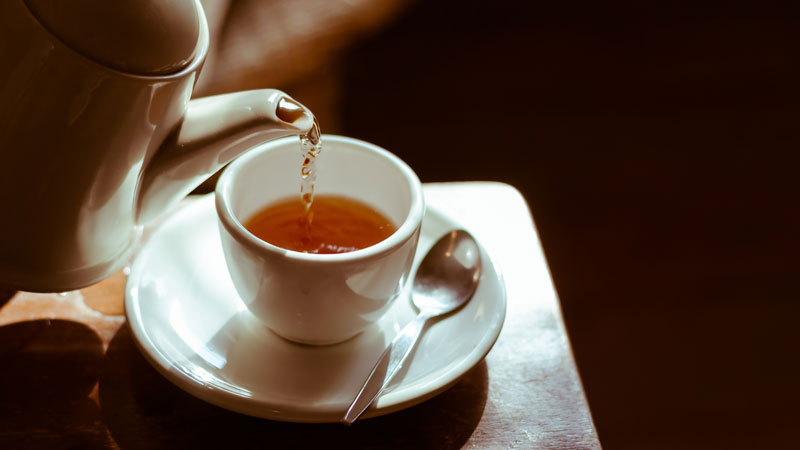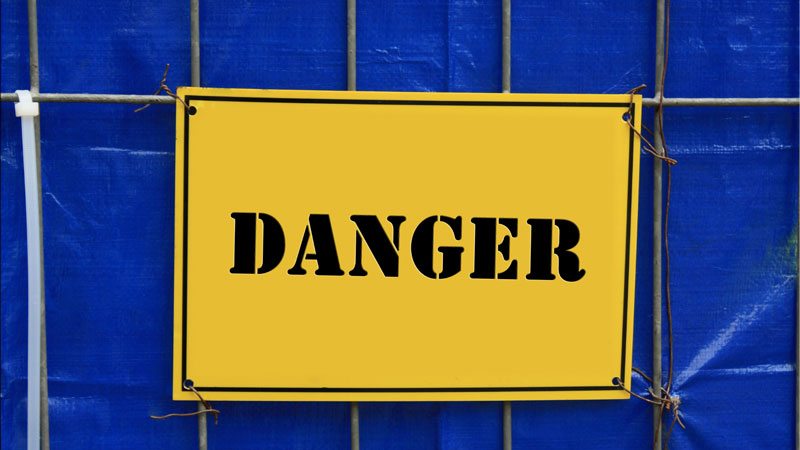Substances | 5 min read
Magic Mushroom Tea: Effects, Warnings, and Health Risks
Medically Reviewed By

On October 9, 2023
Written By
On October 9, 2023

What you will learn
- Magic mushroom tea is made from mushrooms that contain psilocybin and psilocin.
- This tea has the same psychedelic effects as consuming other forms of magic mushrooms.
- Common side effects from consuming magic mushroom tea include panic attacks, disorientation, anxiety, confusion, paranoia, vomiting, increased heart rate, urinary incontinence, nausea, and high blood pressure.
- The long-term effects of magic mushroom tea can cause issues to your mind and body, including flashbacks, visual distortion, and a "bad trip."
Magic mushrooms or shrooms contain psilocybin and psilocin, which create psychedelic or hallucinogenic effects. The effects that are created by this drug are similar to other types of psychedelic drugs.
There can be many different side effects and risks to consuming shrooms. They also come in various forms in which they can be consumed. One of those forms is magic mushroom tea.
What Is Magic Mushroom Tea?
Magic mushroom tea is tea made from dried mushrooms that contain the compounds psilocybin and psilocin. When the shrooms are made into tea, it will oftentimes make it easier to consume. The tea will then transmit the effects of the psilocybin due to it being water-soluble.
When magic mushroom tea is consumed, it typically will provide the effects of the drug much faster. It also provides less chance of nausea when the shrooms are consumed.
How Magic Mushroom Tea Is Made
Magic mushroom tea is made similar to other types of tea. First, the mushrooms are ground into a fine powder. Then it is added to a pot of boiling water that is full enough to cover the mushrooms. They are left in the boiling water for about 20 minutes and then strained through a coffee filter to remove extra mushroom particles.
However, most users do not like the taste of mushroom tea. They will typically add other things to it to make it taste better. However, it is said to taste better than chewing on the dried mushrooms.
Magic Mushroom Tea Doses
Dried shrooms contain a higher amount of psilocybin, which makes them more potent than fresh shrooms. It is difficult to tell how much psilocybin is in each magic mushroom. The potency of magic mushroom tea differs depending on several factors, including what type of mushroom, how much, and the time they were boiled.
Side Effects From Magic Mushroom Tea
Magic mushroom tea creates many effects on the body and mind due to the psilocybin found in the mushrooms. These effects are normally very similar to those of LSD. While short-term benefits can be found when consuming magic mushroom tea, there can also be many negative effects to it as well.
How Long It Takes To Notice The Effects
Once the tea has been consumed, it may take 20 to 40 minutes for the psilocybin present in the mushrooms to take effect. These effects can last up to 6 hours once the mushrooms have been consumed.
Mental Effects
While the mental effects are some of the most sought-after effects of consuming magic mushroom tea, it causes different reactions for each person. Some of the positive experiences that people report from drinking mushroom tea are increased creativity, euphoria, and happy feelings.
Negative effects on the mind when taking shroom tea are:
- Panic attacks
- Disorientation
- Anxiety
- Confusion
- Paranoia
Negative effects of shroom tea may be caused by the environment or the mindset the person is in when they begin taking the drug. This can cause a ‘bad trip’ to happen. Once the bad trip has begun, there is no way to stop it except for trying to get into a better frame of mind and setting.
Physical Effects
When any drug is consumed, it can cause physical side effects. These side effects may make drinking magic mushroom tea less enticing.
Physical side effects of magic mushroom tea include:
- Vomiting
- Increased heart rate
- Urinary incontinence
- Nausea
- High blood pressure
Long-Term Effects
While long-term side effects of magic mushroom tea are rare, they can occur. Some users have experienced various long-term side effects, such as paranoia, disorganized thinking, perceptual disturbances, and mood changes.
There is also a chance of hallucinogen-persisting perception disorder (HPPD), which occurs when a person experiences visual disturbances and hallucinations after the trip has ended. This condition of “flashbacks” [1] is sometimes mistaken for other mental health problems.
Factors That Impact The Effects
The results of the trip will depend on various factors. How much was drunk and how potent the tea was will have an impact on its effects. When other substances or drugs are taken at the same time as the magic mushroom tea, it will have an effect on the way that the substance reacts to the body and mind.
It also has a lot to do with the body and how it metabolizes the tea. Every person is different in the way they process substances. The weight, size, health, and familiarity of consuming the substance will play a role in how the effects are felt.
There are over 200 different types of mushrooms. Each will have different levels of the active ingredient that creates the psychedelic properties. Because they range so differently, it may be difficult to know how much of that ingredient is being consumed.
Magic Mushroom Tea Health Risks
There are some known risks when consuming magic mushroom tea. These are on an individual basis and may not affect everyone who tries it. During a survey, those who used magic mushrooms were more likely to use other drugs such as opiates, LSD, cocaine, and ecstasy.[2]
Mental And Physical Issues
Every type of hallucinogen carries the risk that physical and psychological problems may arise. Someone who consumed the substance may have an emotional or mental problem triggered, which may cause thoughts of harming themselves or others. It’s not recommended to take the drug if someone is suffering from intense depression and anxiety.
Mushroom Poisoning
Magic mushrooms look similar to poisonous mushrooms. [3] This can cause poisonous mushrooms to be consumed by accident. Mushroom poisoning can cause organ damage, severe illness, and even death. Seeking treatment for mushroom poisoning is critical to recovering.
Tolerance And Overdose
Tolerance to magic mushroom tea may increase when it is taken often. This can cause someone to add more mushrooms than necessary to get the same desired effect. When this is the case, an overdose may occur. Mushroom overdoses are typically not fatal but will cause symptoms such as:
- Seizures
- Vomiting
- Muscle weakness
- Paranoia or panic
- Agitation
- Psychosis
If you or someone with you feels that they are suffering from a magic mushroom overdose, medical attention can help alleviate the symptoms.
Psychological Dependence
While psilocybin is not considered to be an addictive drug, someone may depend on the mental effects of the drug. Since tolerance to magic mushroom tea can be built up quickly, it will make it difficult to have the same effects, which may lead to using it more often. This can also cause someone to crave the drug more often and with more intense effects.
Magic Mushroom Tea Withdrawal
Most people don’t notice many physical symptoms of withdrawal after consuming magic mushroom tea. However, when they stop using the drug, they may realize some psychological effects, such as depression.
Treatment For Magic Mushroom Dependence
Treatment for mushroom dependence varies depending on the severity of the problem and what specific needs the patient has. If someone has mental health problems and is abusing the drug, then certain therapies will be recommended alongside treatment.
Options for Substance use disorder or magic mushroom treatment are:
During these treatment programs, participants will benefit from a number of practical and holistic therapy modalities:
- Group therapy
- Individual therapy
- Cognitive-Behavioral Therapy (CBT)
- Support groups such as Narcotics Anonymous (NA)
- Acupressure
- Yoga
- Mindfulness
- Reiki
If someone is having trouble controlling their use of magic mushroom tea, there are options available. Holistic treatment can help you get back on the road to recovery. Contact Ascendant’s NYC Detox Center today to get started.
Frequently Asked Questions About Magic Mushrooms
Magic mushroom tea can only be taken by oral consumption. Attempting to take this intravenously will cause many health problems. Once the tea is made, it will need to be consumed just as any other kind of beverage.
Magic mushroom tea has an earthy, bitter taste to it. Sometimes other herbal teas can be added to the formula to improve the taste. Honey, ginger, reishi mushrooms, and other sweeteners can also help the tea to taste better.
Magic mushroom tea has been used for years for spiritual and ceremonial purposes and for recreational use.
The component of the magic mushroom called psilocybin is the part of the mushroom that gives the user psychedelic effects. When too much of the drug is consumed, it may cause overdose symptoms. However, deaths from overdosing on magic mushroom tea are not typical.
In the majority of the United States, psilocybin is not legalized. This can make obtaining the mushrooms for magic mushroom tea illegal. It’s important to check the states’ and other countries’ laws before attempting to get this drug.
Ascendant New York Editorial Guidelines
Here at Ascendant New York, we understand the importance of having access to accurate medical information you can trust, especially when you or a loved one is suffering from addiction. Find out more on our policy.
[1] van Amsterdam J, Opperhuizen A, van den Brink W. Harm potential of magic mushroom use: a review. Regul Toxicol Pharmacol. 2011 Apr;59(3):423-9. doi: 10.1016/j.yrtph.2011.01.006. Epub 2011 Jan 21. PMID: 21256914. Retrieved from https://pubmed.ncbi.nlm.nih.gov/21256914/ 2023, June 13th
[2] Hallock RM, Dean A, Knecht ZA, Spencer J, Taverna EC. A survey of hallucinogenic mushroom use, factors related to usage, and perceptions of use among college students. Drug Alcohol Depend. 2013 Jun 1;130(1-3):245-8. doi: 10.1016/j.drugalcdep.2012.11.010. Epub 2012 Dec 21. PMID: 23265089. Retrieved from https://pubmed.ncbi.nlm.nih.gov/23265089/ 2023, June 13th
[3] European Monitoring Centre for Drugs and Drug Addiction – Hallucinogenic mushrooms drug profile. Retrieved from https://www.emcdda.europa.eu/publications/drug-profiles/hallucinogenic-mushrooms_en 2023, June 13th




